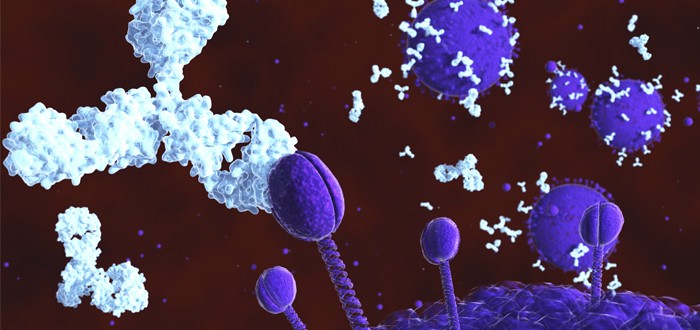Researchers now think glycoengineered anti-GM2 antibodies could someday open up another front in your war against mesothelioma and keep you alive longer.
Because mesothelioma is such an aggressive cancer that usually carries a poor prognosis, researchers are constantly on the lookout for new ways of battling it.
One research team now believes glycoengineered anti-GM2 antibodies will prove to be just what the mesothelioma doctor ordered.
The team discovered that glycoengineered anti-GM2 antibodies exert a therapeutic effect against the pleural form of malignant mesothelioma.
In lab tests, they found the anti-GM2 antibodies cause mesothelioma tumors to decrease in number and size. Their findings appear in the Nov. 25 edition of the journal Cancer Science.
Mesothelioma Is Vulnerable
The anti-GM2 antibody the researchers studied was the Ganglioside GM2 type. This is a glycolipid known to be overexpressed in mesothelioma and other cancers.
A glycolipid is nothing more than a lipid that carries a carbohydrate molecule around with it.
A lipid, meanwhile, is a molecule that stores energy, sends out recognition signals, and helps make up the membrane that surrounds a cell.
Glycolipids help maintain the integrity of cell membranes. So, if something bad were to happen to those glycolipids, the cell membrane might become weakened.
Since glycolipids are overexpressed in a mesothelioma cell, causing something bad to happen to them might be a good thing because it would leave the cell weakened and vulnerable to attack.
The researchers lamented that not much has been written about the potential for using anti-GM2 antibodies as a mesothelioma treatment.
So they broke out their electron microscopes and assay kits to get an up-close and personal look at the anti-GM2 antibody known as BIW-8962 in 11 malignant pleural mesothelioma cell lines.
The Ganglioside GM2 expression they observed in those mesothelioma cell lines was confirmed using flow cytometry. To be precise, they obtained confirmation in eight of those 11 cell lines.
In the remaining three, the Ganglioside GM2 expression was too variable.
Impressive ADCC Activity Against Mesothelioma
According to the researchers, BIW-8962 showed significant ADCC activity against the GM2-expressing mesothelioma cell line MSTO-211H.
ADCC is the abbreviation scientists use when they’re discussing antibody-dependent cell-mediated cytotoxicity, which refers to a nifty trick the immune system pulls.
Basically, that trick is the immune system paints a bull’s-eye on a particular cell before sending a task force of macrophages and other natural-born killers to blast that cell and others like it to smithereens.
The important thing about ADCC is that the target cell’s membrane antigens end up hamstrung by specific antibodies, so they can’t fight back against the overwhelming power of the immune system.
That’s why these glycoengineered anti-GM2 antibodies are such a big deal.
The researchers tested BIW-8962 on an in vivo orthotropic mouse model configured with mesothelioma MSTO-211H cells. There was a significant drop in the incidence and size of mesothelioma tumors as a result of BIW-8962.
“These data suggest that anti-GM2 antibodies may become a therapeutic option for malignant pleural mesothelioma patients,” the researchers wrote.
“Although surgery, chemotherapy, radiotherapy, and combinations of these therapies are used to treat malignant pleural mesothelioma, the median survival of such patients is dismal.”
They concluded that there is “a compelling need to develop novel therapeutics with different modes of action.”


